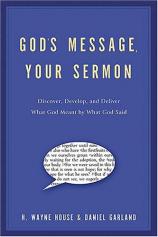God's Message, Your Sermon: Discover, Develop, and Deliver What God Meant by What He Said
Review
God's Message, Your Sermon: Discover, Develop, and Deliver What God Meant by What He Said
Whether you are a preacher, a teacher or a Sunday school teacher, you know that developing a sermon or teaching is a challenging and rewarding experience. How do you know that what you’re teaching is grounded in Scriptural truth? How do you know that you’re handling God’s Word correctly? GOD'S MESSAGE, YOUR SERMON is designed to give readers a very clear and straightforward procedure for developing expository-style sermons from a reading of Biblical text.
Designed for ministers but also a rich resource for lay leaders, the book presents a clear case for why expository preaching is so important in today’s day and age. As John MacArthur explains in the foreword, many pastors today are bombarded with a long list of fads and teachings that promise church growth rather than Biblical soundness. In an age marked by its shallowness, solid preaching and teaching become all the more important. MacArthur writes, “Blessed is the man who keeps preaching the Word, even when such preaching is supposedly out of season.”
Divided into four parts, GOD'S MESSAGE, YOUR SERMON reads like an academic text. The beginning of the book looks at what God meant by what He said. Part two invites readers to examine the components and classifications of an expository sermon. The third part, and the most pragmatically helpful for many speakers, looks at the characteristics of effective expository sermons and communicators. The book closes with a rich section on preaching the various books of the Bible, including the Pentateuch, Historical Narrative, Poetic Books, Old Testament Prophecy, Gospels and Acts, Epistles and Revelation.
Seminary students will be well-versed in many of the authors and books mentioned throughout the text, as well as many of the insights on effective teaching. Authors H. Wayne House and Daniel G. Garland advise, “Think of a listener as a lost traveler depending on the sermon for directions. Good organization causes the material to flow and makes it easier to follow, understand and remember. Clear cognitive, affective, and behavioral lessons aims make the message more persuasive.”
The authors identify parts of a sermon as the introduction, body, conclusion, application and invitation. Then they break down each section with brief but thoughtful analysis. At the back of the book, readers will discover sample textual expository sermons that are quite helpful as examples and are insightful for study.
After ingesting this book, readers not only will deliver better sermons, they also will strengthen their ability to listen to a sermon, analyze it and understand the teaching style behind it. Though at times the text clearly becomes heady, overall the book is very clean and clearly written. Whether you read it in a series of sittings or use it for general reference, there is much to learn and benefit from the insights within. Recommended to seminary students, teachers and professors, as well as anyone who wants to strengthen their own expository sermon deliveries or analysis.
-
Reviewed by Margaret Oines on November 13, 2011
God's Message, Your Sermon: Discover, Develop, and Deliver What God Meant by What He Said
- Publication Date: November 13, 2007
- Genres: Christian, Christian Living
- Paperback: 432 pages
- Publisher: Thomas Nelson
- ISBN-10: 1418526576
- ISBN-13: 9781418526573



